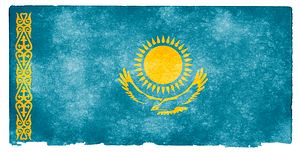On August 18, four activists met in central Almaty, carefully unfurled handmade posters, and stood proudly to demonstrate against sexual violence in Kazakhstan. “I’m against rape culture,” one poster said. Another sign boldly read, “No to sexual violence!”
The group – three young women and a man – did not have permission to gather, but organizer Fariza Ospan refused to let city bureaucracy get in the way of promoting their message. Ospan and her fellow protesters are on a mission to amend Kazakhstan’s criminal code, specifically Article 120, which concerns punishment for rape.
Article 120 has been at the center of an urgent nationwide conversation about rape and sexual assault this summer after a judge passed down a light sentence on two train conductors who beat and raped a passenger in November 2018.
Although prosecutors requested six years prison for the defendants, the court decided each man would get two and a half years behind bars. The judge shaved three months off one man’s sentence because he had already been under house arrest for that long. Neither punishment meets the three to five year jail time required under Article 120, which activists already criticize as insufficient.
News of the lenient sentences spread quickly and struck deep.
Women took to social media and used hashtags like #MeTooTalgo (the name of the passenger train where the woman was raped last winter) and #NeMolchiKZ (in Russian, “Don’t Stay Quiet,” a spin-off of #MeToo that has been used across Eurasia) to share personal stories of sexual violence and near-encounters with rape on Kazakhstan’s trains.
It didn’t take long for the tone of these digital discussions to shift from collective grieving to concentrated organizing, and the categorization of rape as only a “moderate” crime seemed like the best place to start.
Kazakhstan’s lawmakers first made rape illegal in 1997, when they introduced Article 120 into the legal code. At the time it was adopted, Article 120 penalized rape as a “serious” crime. Not long after, however, lawmakers amended the rule and reduced rape to a crime of “moderate” severity.
Many have criticized Article 120 for its characterization of rape as anything less than a serious crime. “In our country, cattle theft is considered a ‘serious’ crime, while raping a woman constitutes only a ‘moderate’ one,” Dina Smailova, human rights activist and leader of the NeMolchi movement in Kazakhstan, told Tengri News on July 26, the day the sentence was announced.
While the digital world buzzed with criticism about this high-profile case and the dismal state of legal protection against sexual violence in Kazakhstan, 25-year old Fariza Ospan decided to take action beyond social media.
On August 8, Ospan and fellow Almaty-based activist Moldir Aban submitted a formal request for an authorized protest with the stated goal of amending Article 120 to return rape to the level of a “serious” crime. Less than a week later, they received a rejection letter from local authorities; the letter cites maintenance on pipes suddenly scheduled for the exact place and time Aban and Ospan’s demonstration was planned.
After a few days debating whether to hold the protest – peaceful assembly without permission from authorities is risky in Kazakhstan – Ospan decided taking a public stand to demand Article 120 be amended was worth the risk. “We knew the problem wouldn’t solve itself, and that no one would help us otherwise,” Ospan told The Diplomat.
At the August 18 demonstration, Ospan carried a sign that read “Broken pipes can wait, but broken souls can’t,” wryly addressed the circumstances of their unsanctioned protest. They stood outside a shopping mall in downtown Almaty for only 40 minutes, but in that short time attracted quite a bit of attention – both supportive and not. Several members of a group called “Anti-Feminism and Anti-LGBT” showed up, intending to interrupt the demonstration by calling the police.
Police showed up but did not make any arrests, a sign that they either did not consider the young activists’ message a threat or that they recognized the symbolic threat of interrupting a protest against sexual violence given the buzz around the Talgo case.
Indeed, the Talgo case has functioned as a sort of tipping point; bringing attention to the dire state of sexual assault and rape in Kazakhstan and amending Article 120 seemed impossible until, now, it appears inevitable. On September 2, President Kasym-Jomart Tokayev will deliver his first State of the Nation address; he indicated plans to instruct Kazakhstan’s parliament to toughen penalties for sexual violence, among other crimes.
































